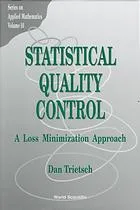Statistical quality control : a loss minimization approach
4.9
Reviews from our users

You Can Ask your questions from this book's AI after Login
Each download or ask from book AI costs 2 points. To earn more free points, please visit the Points Guide Page and complete some valuable actions.Introduction to "Statistical Quality Control: A Loss Minimization Approach"
"Statistical Quality Control: A Loss Minimization Approach" presents a revolutionary perspective on quality control mechanisms, focusing not just on traditional metrics but on minimizing overall quality-related losses. By redefining the concept of quality in terms of loss, the book equips readers with modern, actionable, and highly practical tools to assess, predict, and optimize quality in manufacturing and service environments. Written by Dan Trietsch, this book challenges conventional quality control paradigms and introduces an infrastructure built on robust statistical principles. Combining elements of engineering, business analytics, and decision-making strategies, it serves as an essential reference for professionals, academics, and students who are keen to delve deeper into innovative quality control methodologies.
Detailed Summary of the Book
The book opens with a critical examination of traditional methods of quality control. While such methods have proven beneficial under certain conditions, their reliance on rigid metrics like defect rates, process capability indices, and control limits can restrict broader optimization goals. In contrast, the "loss minimization approach" advocated in this book centers on reducing the hidden costs and inefficiencies caused by deviations from desired quality specifications, even when those deviations technically fall within acceptable limits.
This approach finds its foundation in the Taguchi Loss Function, which demonstrates that the loss imposed by quality deviation increases quadratically as the product or service moves away from the target value. By implementing this concept, the reader learns how to focus on minimizing overall costs, whether in production, service delivery, or customer satisfaction. Practical examples, case studies, and mathematical models are integrated to ensure real-world applicability.
Moreover, the book delves into advanced statistical techniques, shedding light on how regression analysis, hypothesis testing, and process optimization tools can synergistically support loss minimization. Dan Trietsch guides readers to identify and eliminate the root causes of poor quality while aligning quality improvements with business profitability and sustainability. The book also bridges the gap between theoretical concepts and implementation, ensuring that readers can directly adopt these methodologies in operational settings.
Key Takeaways
- Understand the limitations of traditional quality management practices and their impact on operational efficiency.
- Learn about the fundamentals of the loss minimization approach and its advantages over defect-centric methods.
- Develop an appreciation for the Taguchi Loss Function and how to practically apply it in various industries.
- Master the integration of modern statistical tools and methods to enhance process reliability and minimize costs.
- Gain deeper insights into how loss minimization aligns quality enhancement efforts with organizational objectives like profit maximization and customer satisfaction.
Famous Quotes from the Book
- "Quality is more than the absence of defects—it is the presence of value."
- "Every deviation from the target value is a potential source of loss, whether visible or not."
- "Optimization is not about avoiding problems; it's about learning to minimize their impact while maximizing value."
- "In loss minimization, the question isn’t 'Is it acceptable?' but 'Is it optimal?'"
Why This Book Matters
In an age where quality is a key differentiator in competitive markets, this book addresses the urgent need for a paradigm shift in quality control practices. Unlike traditional methods, which often aim merely to meet standards or stay within tolerances, the loss minimization approach prioritizes the comprehensive reduction of costs associated with poor quality—whether visible or hidden. By adopting this philosophy, organizations can achieve superior operational performance, impact their bottom line positively, and elevate customer satisfaction levels.
This book is not just for quality engineers; it’s a vital resource for business leaders, process managers, and students seeking a modern framework to ensure sustainability in performance improvement efforts. By bridging theoretical knowledge with actionable strategies, Dan Trietsch provides an invaluable guide for transforming how we think about and manage quality. With its focus on analytical rigor, practical solutions, and alignment with organizational goals, "Statistical Quality Control: A Loss Minimization Approach" is a must-read for anyone striving to achieve excellence in quality management.
Free Direct Download
Get Free Access to Download this and other Thousands of Books (Join Now)
For read this book you need PDF Reader Software like Foxit Reader
Accessing books through legal platforms and public libraries not only supports the rights of authors and publishers but also contributes to the sustainability of reading culture. Before downloading, please take a moment to consider these options.
Find this book on other platforms:
WorldCat helps you find books in libraries worldwide.
See ratings, reviews, and discussions on Goodreads.
Find and buy rare or used books on AbeBooks.


